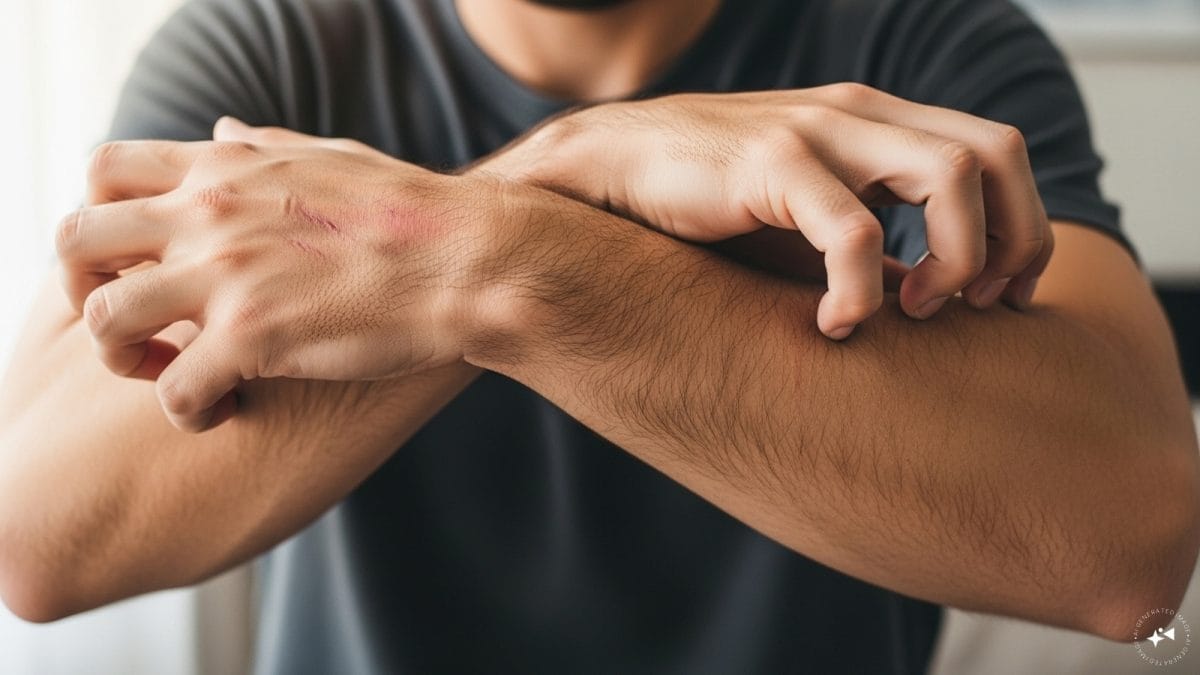Last Updated:
Psoriasis affects about 2–3% of the global population translating to more than 125 million people worldwide according to the World Health Organization (WHO, 2023)

Processed foods and alcohol can worsen psoriasis symptoms.
Psoriasis, a chronic inflammatory skin disease affecting millions worldwide, results from immune system dysregulation that causes inflammation and rapid skin cell turnover. While diet alone does not cause psoriasis, certain foods may contribute to systemic inflammation and potentially exacerbate symptoms in susceptible individuals.
Concerningly, psoriasis affects about 2–3% of the global population translating to more than 125 million people worldwide according to the World Health Organization (WHO, 2023) and the International Federation of Psoriasis Associations (IFPA). Understanding the relationship between diet in general, and widely consumed food items like chocolate, coffee, and spicy food in particular, can help patients better manage their condition.
Dr. Chinmai C. C., MBBS, MD, DNB, MRIDU, The Skin Theory shares all you need to know.
How Diet Plays a Significant Role
Diets rich in anti-inflammatory foods such as fruits, vegetables, whole grains, omega-3 fatty acids (found in fish), and nuts may improve psoriasis symptoms. Conversely, diets high in red meat, dairy, processed foods, and sugar appear to worsen inflammation and disease severity in some patients. Eliminating or reducing these can help manage flare-ups.
Emerging research also highlights the link between gut microbiota and immune regulation, suggesting that foods promoting digestive health such as probiotic yogurt, leafy greens, and fiber-rich grains can positively influence skin outcomes. Adequate hydration, balanced micronutrient intake, and mindful eating habits further support overall wellness.
As dietary triggers vary widely, keeping a food diary to track daily intake and symptom patterns can provide valuable insights into personal triggers and long-term management.
Coffee and Caffeine: How Much Is Too Much?
Moderate coffee intake up to three cups daily may even confer anti-inflammatory benefits due to antioxidants called polyphenols. However, excessive coffee or caffeine consumption (more than four cups daily) has been linked to worsening inflammation and psoriasis symptoms in some patients.
Some individuals with psoriasis report improvement after reducing caffeine, possibly because caffeine can increase anxiety and stress, both known flare triggers. Thus, moderation and individual tolerance are key when consuming coffee.
Chocolate: Balance Is Key
Chocolate itself is not a direct psoriasis trigger but can be problematic if it contains high amounts of added sugars and fats. Diets high in sugar are commonly associated with increased inflammation and worsening psoriasis.
Dark chocolate with minimal additives may be better tolerated, but processed sweets should be limited. People with psoriasis should monitor their individual reactions, as highly processed or sugary foods can contribute to flare-ups.
Spicy Food: The Least Triggering
The key compound in spicy peppers, capsaicin, has complex and dual effects on the body. On one hand, capsaicin can irritate sensitive skin by stimulating sensory nerve endings and triggering histamine release, potentially worsening inflammation in some psoriasis patients. On the other hand, capsaicin demonstrates anti-inflammatory and pain-relieving properties when applied topically, hinting at nuanced immune modulation.
Research suggests that capsaicin’s interaction with the transient receptor potential vanilloid 1 (TRPV1) receptor influences immune responses, but individual sensitivity plays a major role. Importantly, stress and anxiety which can be affected by dietary stimuli, including spicy foods are well-known psoriasis flare triggers.
Takeaway
Psoriasis is an immune-driven inflammatory disease, so foods that increase systemic inflammation sometimes influenced by personal gut microbiota and metabolic health may exacerbate symptoms.
While chocolate, coffee, and spicy foods may trigger psoriasis flare-ups in certain individuals, the evidence remains variable and highly individualized. Moderation, awareness of overall diet quality, and consultation with healthcare providers or dietitians can empower patients to tailor their diet for better skin health and long-term management of psoriasis.

Swati Chaturvedi, a seasoned media and journalism aficionado with over 10 years of expertise, is not just a storyteller; she’s a weaver of wit and wisdom in the digital landscape. As a key figure in News18 Engl…Read More
Swati Chaturvedi, a seasoned media and journalism aficionado with over 10 years of expertise, is not just a storyteller; she’s a weaver of wit and wisdom in the digital landscape. As a key figure in News18 Engl… Read More
October 27, 2025, 16:43 IST






